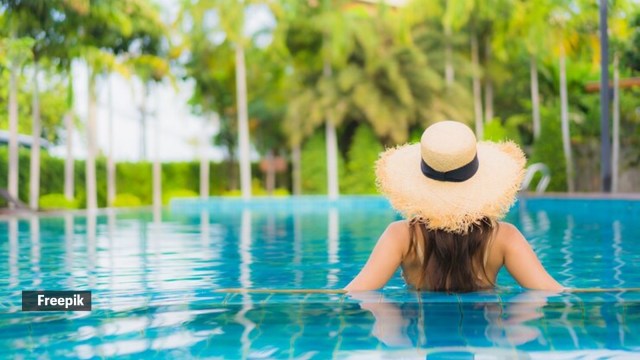📣 For more lifestyle news, click here to join our WhatsApp Channel and also follow us on Instagram
Chlorinated swimming pools are dangerous to health; here are some expert-approved safer alternatives
According to Dr Senapathi, the shift towards chlorine-free pool alternatives reflects a growing awareness of health concerns associated with traditional pool sanitation methods
 Occasional swimming does not cause significant side effects but frequent swimming in high chlorine built up pools may lead to health hazards (Source: Freepik)
Occasional swimming does not cause significant side effects but frequent swimming in high chlorine built up pools may lead to health hazards (Source: Freepik)Summer holidays and relaxing vacations are incomplete without a dip in swimming pools with their characteristic blue tiles and crystal-clear water. If you love pools but hate the adverse effects that come with them, fear not. We bring you a range of safer and healthier alternatives, along with necessary precautions to take before frolicking in the water.
Why is chlorine water bad for you?
“Chlorine and its byproducts, such as trihalomethanes and chloramines, can irritate the skin. In patients with sensitive skin, it can cause xerosis (dry skin), allergic contact dermatitis (eczema flares), and irritation of the nose and eyes when water gets inside,” said Dr Agni Kumar Bose, a dermatologist, venereologist, and dermatosurgeon.
“Pools are sanitised using a variety of chlorine-based compounds like sodium hypochlorite, calcium hypochlorite, and chlorine gas. When these compounds come in contact with water, they form a weak acid known as hypochlorous acid (HOCL), which is the actual sanitizing agent,” said Dr Roohi Pirzada, a senior physician and critical care specialist in Mumbai.
According to Pirzada, occasional swimming does not cause significant side effects, but frequent swimming in high-chlorine pools may lead to respiratory hazards, including allergic coughs, bronchitis, and sometimes bronchial asthma. Changes in the pH balance of the skin can also cause low blood pressure, although this is rare.
“Typically, a 30 to 40-minute session may be fine, but beyond this, a person may feel dehydrated and experience itchy or red eyes, which is a sign to get out of the pool,” she said.
 Pools are sanitized using a variety of chlorine based compounds like sodium hypochlorite, calcium hypochlorite and chlorine gas (Source: Freepik)
Pools are sanitized using a variety of chlorine based compounds like sodium hypochlorite, calcium hypochlorite and chlorine gas (Source: Freepik)
Safer alternatives
According to Dr. Pradeep Senapathi, Member of DocTube Professor in Community Medicine, AJIMS RC, Mangalore, the shift towards chlorine-free or reduced-chlorine pool alternatives reflects a growing awareness of health concerns associated with traditional pool sanitation methods. He recommended the following options to choose from for a healthier swimming experience.
- Saltwater Pools utilize a chlorine generator that converts salt into chlorine, offering a milder, more natural swimming experience with reduced chemical odor and skin irritation.
- UV (Ultraviolet) Disinfection Systems use UV light to neutralize bacteria and viruses in water, minimizing the need for chlorine and reducing chemical exposure.
- There are natural swimming pools that employ biological filters and plants to maintain water quality, providing a chemical-free and ecologically balanced swimming environment.
- You can also harness ozone’s oxidizing power to sanitize water effectively, significantly reducing the reliance on chlorine and its associated health risks.
Pirzada suggested the following precautions be taken before getting into swimming pools with chlorinated water:
- Take one minute of rinse shower before getting into the pool to avoid taking a trail of dirt in the pool.
- Use sunscreen 15 minutes before entering the pool. Allow your skin to absorb it.
- One can also use coconut oil to protect the skin barrier.
- Prefer to use eye shield and avoid emitting body waste in the pools.
- After swimming, promptly remove the bathing suit and take a thorough and clean shower with antiseptic soap and follow it up with a Vitamin C moisturiser.
- Never eat in the pools; this may attract pests and bacteria.
- Stay hydrated with a Vitamin C fortified drink or natural juices to replenish insensible water losses.
📣 For more lifestyle news, click here to join our WhatsApp Channel and also follow us on Instagram



- 01
- 02
- 03
- 04
- 05
























